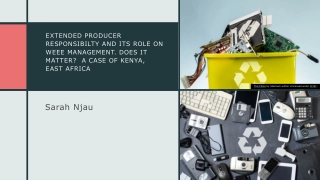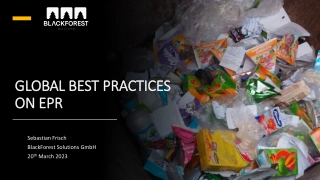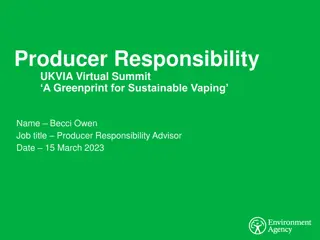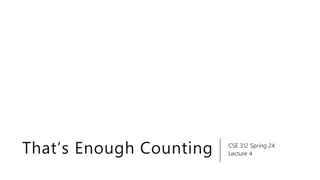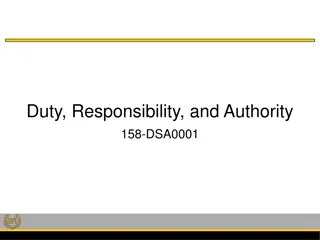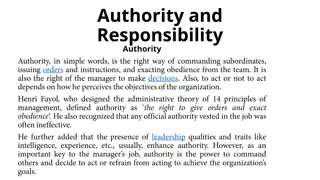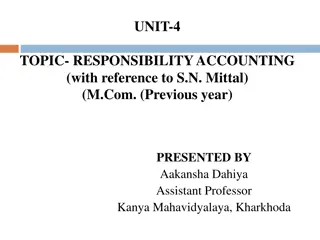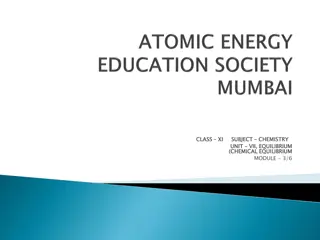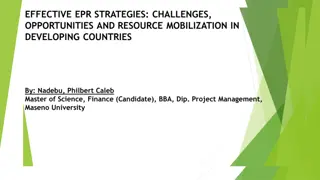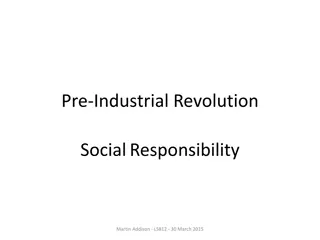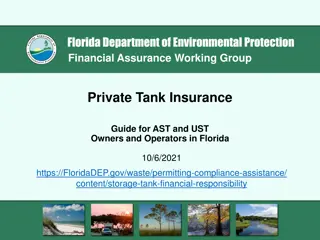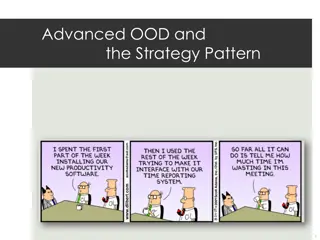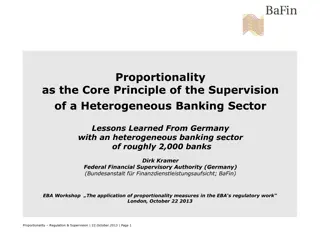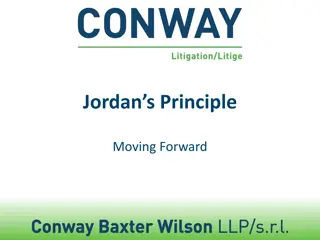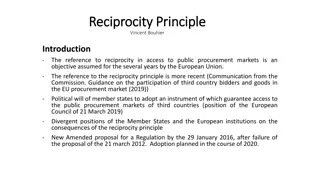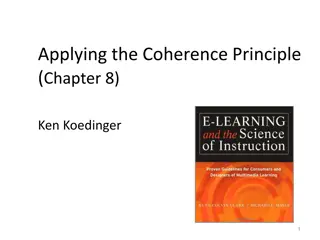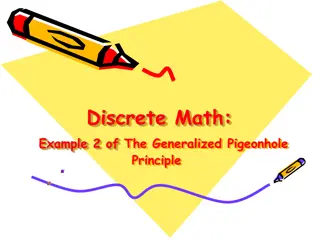The Impact of Extended Producer Responsibility on WEEE Management in Kenya
Extended Producer Responsibility (EPR) plays a crucial role in managing Waste Electrical and Electronic Equipment (WEEE) by shifting the responsibility of end-of-life product disposal to producers. In Kenya, proposed EPR categories cover a range of products from packaging to non-packaging items, aim
0 views • 9 slides
Understanding Extended Producer Responsibility (EPR) and Producer Responsibility Organizations (PRO)
This informative content delves into the concept of Extended Producer Responsibility (EPR) and the role of Producer Responsibility Organizations (PRO) in waste management. It covers EPR definitions, experiences from different EPR systems, and the setup flow among stakeholders. The discussion emphasi
2 views • 17 slides
Understanding Producer Responsibility in UK: Regulations for Sustainable Vaping
Producer Responsibility in the UK entails businesses taking accountability for the environmental impact of their products, including packaging, electrical equipment, batteries, and end-of-life vehicles. This responsibility extends to vapes as they fall under the Waste Electrical and Electronic Equip
0 views • 10 slides
Understanding Personal Responsibility
Personal responsibility is the state of being accountable and answerable for one's actions within their control. It involves valuing responsibilities over rights, respecting others, and striving to do one's best. Examples from clips show individuals taking responsibility for their actions, displayin
1 views • 11 slides
Heisenberg's Uncertainty Principle in Elementary Quantum Mechanics
Heisenberg's Uncertainty Principle, proposed by German scientist Werner Heisenberg in 1927, states the impossibility of simultaneously and accurately determining the position and momentum of microscopic particles like electrons. This principle challenges classical concepts of definite position and m
0 views • 49 slides
Counting Principles and Pigeonhole Principle Explained
Explore the concepts of counting principles and the pigeonhole principle through practical examples and tips. Learn how to apply these principles to solve problems effectively. From understanding basic counting rules to the advanced pigeonhole principle, this content provides insights and guidance o
0 views • 35 slides
Love and Responsibility in Second Marriage Matrimony
Second marriages bring a unique blend of love and responsibility, offering a fresh start while building on past experiences. In second-marriage matrimony, individuals often find a deeper appreciation for companionship and mutual respect. Love is nurtured through shared understanding and the wisdom g
3 views • 1 slides
Understanding Duties, Responsibilities, and Authority in the Military
Explore the roles of noncommissioned officers (NCOs) in the military, focusing on duties, responsibilities, and authority. Understand the types of duties, including directed, implied, and specified. Delve into the different forms of responsibility such as command and individual responsibility. Learn
8 views • 10 slides
Exploring Responsibility and Social Change in 'Young and Old' Play
In the play "Young and Old," the characters Eric, Sheila, and Gerald represent the younger generation, while Arthur and Sybil symbolize the older generation. The story delves into the concept of responsibility, highlighting the different attitudes towards Eva's death. Arthur and Sybil, despite being
0 views • 9 slides
Understanding Ethics and Social Responsibility in Entrepreneurship
Ethics and social responsibility play a vital role in the world of business. This module covers topics such as defining ethics and social responsibility, levels of ethical management, making ethical decisions, different views on social responsibility, and creating social responsibility programs for
0 views • 20 slides
Understanding Classical Mechanics: Variational Principle and Applications
Classical Mechanics explores the Variational Principle in the calculus of variations, offering a method to determine maximum values of quantities dependent on functions. This principle, rooted in the wave function, aids in finding parameter values such as expectation values independently of the coor
0 views • 16 slides
Responsibility Workshop for Student Development
Explore the theme of accepting responsibility with engaging activities to help students understand the importance of personal accountability. Through discussions, activities, and reflection, students will learn key concepts and practical tips to enhance their sense of responsibility in various aspec
0 views • 7 slides
Understanding Authority and Responsibility in Organizational Dynamics
Authority and responsibility are key elements in organizational structures. Authority represents the legal right of a superior to command subordinates, often delegated down the hierarchy. Responsibility, on the other hand, is the obligation of a subordinate to perform assigned tasks without delegati
0 views • 5 slides
Key Terms in Ch. 21: Reaction, Revolution, and Romanticism, 1815-1850
The key terms discussed in Chapter 21 include principle of legitimacy, balance of power, ideology, conservatism, principle of intervention, ultraroyalists, ministerial responsibility, and liberalism. These terms highlight important political philosophies and concepts during the post-Napoleonic era a
0 views • 17 slides
Responsibility Accounting in Organizations - Key Concepts and Principles
Responsibility accounting is a system that recognizes decision centers in an organization and links costs to individual managers responsible for decisions. Principles include tracing costs directly to responsible units, setting clear goals, and reporting variances for performance evaluation. Pre-req
0 views • 14 slides
Understanding Le Chatelier's Principle in Chemical Equilibrium
Le Chatelier's Principle states that when a system at equilibrium is disturbed by changes in concentration, temperature, or pressure, the equilibrium shifts to counteract the change. This principle can be applied to predict the direction of equilibrium when changes occur. Changes in concentration, p
0 views • 10 slides
Understanding the Multiplication Counting Principle in Probability
The Multiplication Counting Principle and Permutations play a crucial role in determining the number of possible outcomes in various processes. This lesson covers how to use factorials to count permutations, compute arrangements of individuals, and apply the multiplication counting principle to dete
0 views • 14 slides
Understanding Jordan's Principle and Its Impact on First Nations and Inuit Children in Canada
Jordan's Principle was named in memory of Jordan River Anderson, a young boy whose tragic story led to the establishment of a legal requirement ensuring access to services for First Nations and Inuit children in Canada without delays or disruptions. This principle aims to prevent situations where ch
0 views • 9 slides
Embracing Personal Responsibility: Integrity in Action
Understanding and embodying personal responsibility is crucial for success in various aspects of life. This involves accepting accountability without making excuses, demonstrating integrity in all endeavors, and recognizing how responsibility shapes workplace dynamics. By defining, differentiating,
0 views • 12 slides
Implementing Teaching Personal and Social Responsibility (TPSR) in New Zealand Secondary School Physical Education
The program focuses on helping students develop personal and social responsibility by teaching them to conduct themselves responsibly and treat others well. It includes sharing understanding, reviewing the TPSR model, applying the model in PE classrooms, connecting with school-wide initiatives, enga
1 views • 8 slides
Strategies and Challenges in Extended Producer Responsibility for E-waste Management
Extended Producer Responsibility (EPR) in developing countries involves manufacturers taking responsibility for end-of-life products. This entails executing buy-back initiatives, facilitating e-waste recycling, paying government levies, and adopting eco-friendly production techniques. Government pla
0 views • 8 slides
Insights into Pre-Industrial Revolution Social Responsibility by Martin Addison
Explore the dynamics of social responsibility in the pre-Industrial Revolution era, contrasting the impact of corporate social responsibility on decision-making processes and organizational outputs. Delve into the complexities of charity, profit, and individual agency within diverse economic framewo
1 views • 21 slides
Understanding Responsibility and Its Impact
Responsibility involves taking care of oneself and others, carrying out duties carefully, and ensuring tasks are completed. It encompasses elements like cheerfulness, honor, positive attitude, school pride, accountability, and cleanliness. Being responsible means fulfilling various roles, from wakin
0 views • 23 slides
Understanding Fluids, States of Matter, and Phase Changes
Exploring key concepts in physics including Bernoulli's Principle, viscosity, cohesion, states of matter (solid, liquid, gas, plasma), phase changes (evaporation, condensation, etc.), density, pressure, and more. Discover the properties and behaviors of fluids in relation to gases and liquids, along
1 views • 54 slides
Understanding the Acceleration of the Universe and the Equivalence Principle Violation in the Horndeski Vector-Tensor Theory
Exploring the implications of the Equivalence Principle Violation after reheating in the context of the accelerated expansion of the universe. The study delves into the Horndeski vector-tensor theory, gravitational waves, and the impact of modified gravity and dark energy. Insights are provided on t
2 views • 20 slides
Understanding R2P as a Valuable Perspective for Peacekeepers
The Global Centre for the Responsibility to Protect discusses in Module 2 why the Responsibility to Protect (R2P) serves as a valuable lens for peacekeepers. It delves into the definition of R2P, the importance of protecting civilians in UN peacekeeping contexts, and the guiding principles of Protec
0 views • 26 slides
The Multiplication Counting Principle in Probability: Exploring Permutations
Exploring the multiplication counting principle in probability, this lesson delves into determining the number of ways to complete a process involving multiple steps. Using factorials for permutations, the content showcases how to compute permutations of individuals taken at a time. Through examples
0 views • 20 slides
Understanding Hardy-Weinberg Principle and Genetic Frequencies
Gene pool and allele frequencies play a crucial role in the Hardy-Weinberg Principle, a mathematical model predicting allele frequencies over generations. The principle outlines conditions like a large population, absence of mutations, random mating, and more. Equations such as p² + 2pq + q² = 1 h
0 views • 44 slides
Guide to Storage Tank Financial Responsibility for Owners and Operators in Florida
Understanding the financial responsibility requirements for regulated aboveground and underground storage tanks in Florida is essential for tank owners and operators. This guide provides information on different mechanisms to comply with financial responsibility regulations, including private insura
0 views • 10 slides
Understanding Advanced Object-Oriented Design and the Strategy Pattern
Delve into the intricate world of Object-Oriented Design (OOD) with a focus on the Strategy Pattern. Explore the fundamental principles of OOD, such as encapsulation, abstraction, and the Single Responsibility Principle. Discover how objects interact through messages and how to ensure each class has
0 views • 22 slides
Principle of Majority Rule in Company Law
The principle of majority rule is a fundamental aspect of company law, where the powers of control over a company rest with the general meeting representing the majority shareholders. This principle emphasizes that decisions are made by a simple or special majority vote, except for powers vested in
0 views • 9 slides
Proportionality as Core Principle in Supervising Heterogeneous Banking Sectors: Lessons from Germany
The supervision of a diverse banking sector, such as Germany's with roughly 2,000 banks, is based on the core principle of proportionality. This approach involves tailoring regulations and oversight to fit the individual characteristics of each institution, focusing on qualitative aspects, organizat
0 views • 8 slides
Jordan's Principle: Advocating for First Nations Children's Rights
Jordan's Principle is a vital advocacy tool aimed at ensuring equitable access to necessary services for First Nations children, emphasizing prompt resolution of jurisdictional disputes. Originating from the story of Jordan River Anderson, its implementation has faced challenges and legal battles. C
0 views • 21 slides
Understanding Ethical Responsibility in Human Communication
Ethical responsibility in human communication entails making judgments on rightness, wrongness, virtue, and obligation. It explores the importance of choice, coercion, and the distinction between morals and ethics. The text delves into relativism, ethical ramifications in communication, and the prac
0 views • 9 slides
Understanding the Pigeonhole Principle in Mathematics
The Pigeonhole Principle, demonstrated through examples and explanations by Dr. J. Frost, illustrates the concept that if you have more "pigeons" than "holes," then at least one "hole" must contain multiple "pigeons." This fundamental principle is essential in solving various mathematical problems i
0 views • 27 slides
Understanding the Reciprocity Principle in Public Procurement Markets
The concept of reciprocity in access to public procurement markets, particularly in the European Union, has gained prominence in recent years. This principle involves mutual opening obligations for public procurement markets while considering concessions and exceptions, such as excluding defense and
0 views • 4 slides
Writing Lab: Principal vs. Principle
Learn the differences between "principal" and "principle" with this informative Writing Lab mini-lesson. Understand their varied meanings as nouns and adjectives, and how they are used in different contexts. Enhance your diction skills and avoid common usage errors. Enjoy learning about the principa
0 views • 4 slides
Corporate Social Responsibility Scavenger Hunt Assignment
Engage students in a corporate social responsibility scavenger hunt focused on researching and presenting on top companies with impactful social responsibility initiatives. The assignment involves selecting a company, creating a PowerPoint presentation detailing their CSR efforts, and collaborating
0 views • 5 slides
Enhancing Student Learning Through Coherence Principle
The Coherence Principle emphasizes the importance of excluding extraneous, entertaining materials to improve student learning. Including such materials can compete for cognitive resources and divert attention from essential information. Utilizing simpler visuals and avoiding websites that violate th
0 views • 7 slides
Understanding the Generalized Pigeonhole Principle in Discrete Math
The Generalized Pigeonhole Principle is illustrated through an example involving selecting cards from a deck. By strategically grouping the cards, we determine the minimum number needed to guarantee at least three cards of the same suit are chosen. Additionally, the process is applied to finding the
1 views • 5 slides
